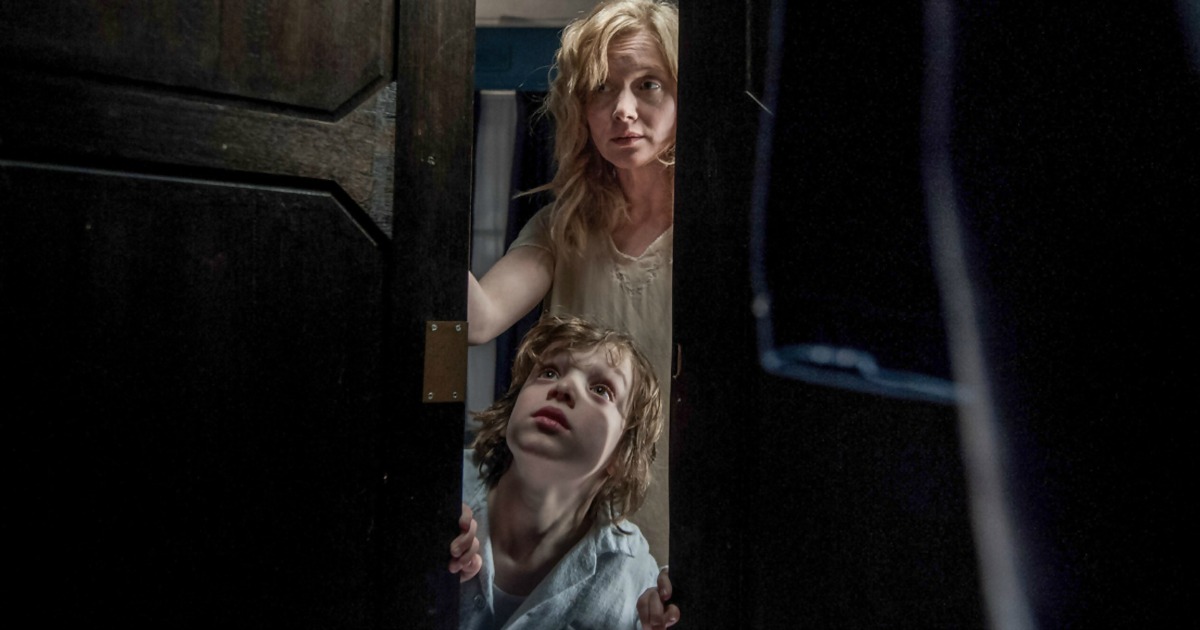
It is altogether rare when a horror film works as equal parts psychological character excavation and a genuinely scary piece of cinema (to be fair, not all horror aspires to both). In Jennifer Kent’s debut film The Babadook, the two are bone-chillingly inextricable by making a grief-ridden mother-son relationship the nucleus from which a storybook monster’s infiltration is born. Statements like this are not usually in my deck of words, but after seeing this heartbreaking and deeply disquieting tale of woe, it is hard to deny The Babadook‘s status as the best horror film of the decade so far.
Amelia (Essie Davis) is spent. Her husband died in a car accident while driving her to the delivery room. She is raising their child Samuel (Noah Wiseman), now six, on her own. He is, to put it mildly, a handful. He suffers from serious behavioral problems and has trouble connecting to peers. He is beholden to impulses and outbursts; usually some form of shrieking is involved. And he is fixated by the idea that there are monsters lurking about. He has built dangerous defense weapons he has and brings them to school, resulting in his expulsion.
A paragraph that started about Amelia instantly became about Samuel. That’s because as we witness her everyday routine in these opening scenes, it is clear she is a non-entity in her own life. Samuel’s name is shouted countless times; we hardly ever hear hers. She is depleted; her frayed blonde hair, bare face, and barely pink uniform make her look like a shabby peach. Hell, she can’t even masturbate in peace. She has exhausted the good will of her sister (who doesn’t like to come round to her house because it’s too ‘depressing’) and a potential romantic interest turns out to be a total non-starter. Samuel is all Amelia has, and vice versa.
One night, as per their nightly routine, Samuel picks out a bedtime story book from the shelf called Mister Babadook. Amelia has never seen the book before, but nevertheless begins to read it aloud. The grotesque pop-up illustrations, which channel Dave McKean, are simple and prophetic in their black-eyed directness. And so the Mister Babadook of the macabre tale begins to invade their already vulnerable domestic space.
The Babadook of the title is a specter, an invader, a possessor, and a curse of sorts. He looks like an upright Lon Chaney in London After Midnight; its mobility is contrasted with unnerving stillness. In another of several invocations of silent cinema (magic is another through line, with Georges Méliès bridging the two) it often faces Amelia, Samuel and us dead-on and from afar, a projection of fears and the unspoken. The equally utilized use of sound tracks the insect-like clickity-clacks of unseen movement, and of course that croaky scrawl of “Bab—ba–doook. Dook. Dooooook”.
The titular creature is all of these things, and disturbing in his own right, but he is first and foremost a metaphoric manifestation of Amelia’s grief, the lurking presence of unresolved loss. Horror is so often about the lingering, about spiritual entities that have yet to reconcile their own stories. And it can easily become an uninvolving cliché because its inherent function as expository resolution. Here, the lingering belongs to the living, the Babadook an outgrowth of the taboo feelings of resentment and futility Amelia has towards her son. She loves her son, yes, but she also kind of hates him too. This film is chockfull of uneasy emotions and depressions laid bare that films tend to sideswipe and/or simplify.
Writer/director Jennifer Kent uses the roots of domestic horror to amplify the increasingly isolated central dynamic. What is supposed to be a safe space becomes distorted, the nature of family turned upside down. Amelia and Samuel’s home looks dreary despite its otherwise lovely essence. The monochromatic color palette of remote blues and grays, colors that are warm and familiar in small doses, are cold and claustrophobic in their totality, like a more naturalistic (by comparison) Possession.
Ambiguity is upheld, but Kent does not stake a claim there. At the end of the day, the question of the Babadook’s existence doesn’t really matter. What matters is that either way, all the film’s terrors and evils are borne out of real emotional turbulence. Roles and control shift into upsettingly resonant formations.
How have I drifted this far without mentioning the film’s true anchor, Essie Davis? A marvel by any measurement, her Amelia is fragile, achingly lonely, and at a loss. And then a force of nature; looming, ferocious, and unhinged. She is fighting with herself, giving in and getting out with everything she has got. She hits every single beat with an all-too relatable humanity, especially as she struggles in more way than one to be a person again. We watch as she registers the unfamiliarity she has with herself.
It is a testament to the writing and performance by Noah Wiseman that Samuel, for all his grating qualities, remains sympathetic. This is crucial; for all its other qualities, the film would not work if we felt no empathy for him. Sure, there’s no way we would want to spend a day with him, placating and smoothing things over. But Kent is always clear on the fact that Samuel is troubled and not an insolent brat. At one point, he asks his mother “Why don’t people like me”, and it is heartbreaking. The character is a tricky high-wire act of acting, editing, and directing.
Jennifer Kent brings a classical eye to her compositions, assured and stoic. The hard-hitting frights play for keeps (in other words, simple jump scares not wanted). In-camera effects are heavily relied on and it makes a considerable difference. Never underestimate the power of tangible physicality. And rest assured horror aficionados, this one gets under the skin; ambiguous without hinging entirely the internal, terrifying without ever playing its scares as an exercise. An exacting nightmare portrait of single motherhood, grief, and the unspoken complexities that can come with child-rearing, led by the ferociously powerful performance by Essie Davis, try as you might; you can’t get rid of The Babadook.





![Bergman Island (The Criterion Collection) [Blu-ray]](https://criterioncast.com/wp-content/uploads/2022/11/bergman-island-the-criterion-collection-blu-ray-400x496.jpg)
![This Is Not a Burial, It’s a Resurrection (The Criterion Collection) [Blu-ray]](https://criterioncast.com/wp-content/uploads/2022/11/this-is-not-a-burial-its-a-resurrection-the-criterion-collection-blu-ray-400x496.jpg)
![Lars von Trier's Europe Trilogy (The Criterion Collection) [The Element of Crime/Epidemic/Europa] [Blu-ray]](https://criterioncast.com/wp-content/uploads/2022/11/lars-von-triers-europe-trilogy-the-criterion-collection-the-element-of-400x496.jpg)
![Imitation of Life (The Criterion Collection) [Blu-ray]](https://criterioncast.com/wp-content/uploads/2022/11/imitation-of-life-the-criterion-collection-blu-ray-400x496.jpg)
![The Adventures of Baron Munchausen (The Criterion Collection) [4K UHD]](https://criterioncast.com/wp-content/uploads/2022/11/the-adventures-of-baron-munchausen-the-criterion-collection-4k-uhd-400x496.jpg)
![Cooley High [Criterion Collection] [Blu-ray] [1975]](https://criterioncast.com/wp-content/uploads/2022/11/cooley-high-criterion-collection-blu-ray-1975-400x496.jpg)